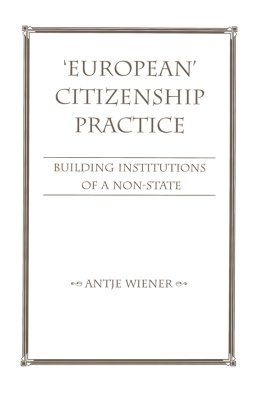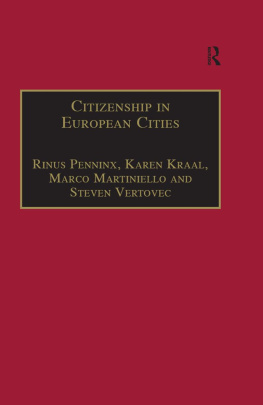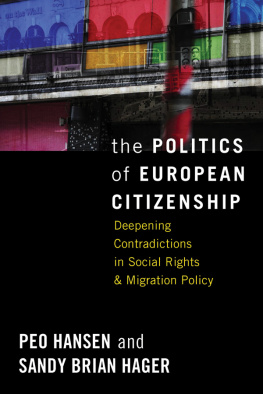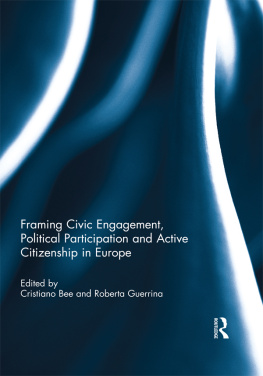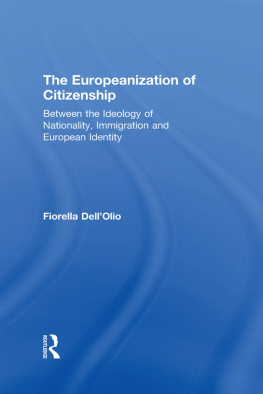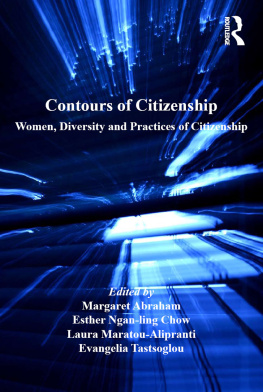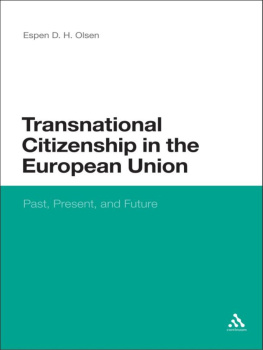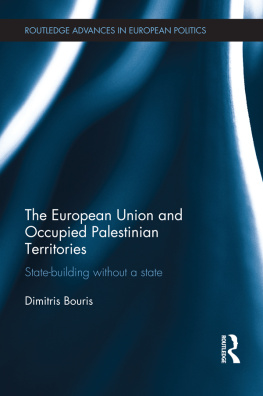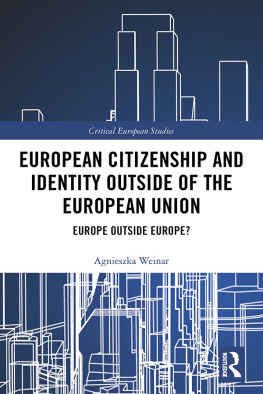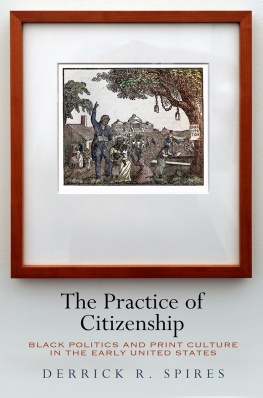First published 1998 by Westview Press
Published 2018 by Routledge
711 Third Avenue, New York, NY 10017, USA
2 Park Square, Milton Park, Abingdon, Oxon OX14 4RN
Routledge is an imprint of the Taylor & Francis Group, an informa business
Copyright 1998 Taylor & Francis
All rights reserved. No part of this book may be reprinted or reproduced or utilised in any form or by any electronic, mechanical, or other means, now known or hereafter invented, including photocopying and recording, or in any information storage or retrieval system, without permission in writing from the publishers.
Notice:
Product or corporate names may be trademarks or registered trademarks, and are used only for identification and explanation without intent to infringe.
Library of Congress Cataloging-in-Publication Data
Wiener, Antje.
European citizenship practice : building institutions of a non-
state / Antje Wiener.
p. cm.
Includes bibliographical references and index.
ISBN 0-8133-3358-X (hc) ISBN 0-8133-3689-9 (pb)
1. CitizenshipEuropean Union countries. 2. European Union.
KJE5124.W54 1998
341.2422dc21
97-27764
CIP
ISBN 13: 978-0-8133-3689-3 (pbk)
This book is the product of much traveling. A range of institutions and people have supported the project. Thanks for financial support go to Carleton University, the European University Institute in Florence, the German American Academic Council among others, and, in particular, to the Human Capital & Mobility Programme of the European Commission which provided most generous funding for the final two years of research and writing at the Sussex European Institute at the University of Sussex.
For logistics and access to documents I am extremely thankful to the staff of the European Commission libraries in Brussels, the European Commission delegation in Ottawa and colleagues at Sussex. Special thanks for ongoing support in Brussels are due to numerous practitioners and policy makers, in particular Dorothee Beltz, Hermann Bnz, Marie-Anne Coninsx, Manfred Degen, Folker Hellmund, Hans Hofmann, Kerstin Joma, Renate Londot, Hartmut Offele, Wolfgang Pellul, Gerd Tebbe and David Williamson.
While I am responsible for this version of the book, I am indebted to many colleagues who took the time to read either major parts or all of the manuscript and made detailed comments at various stages. Among them were Jose Bergeron, Mathias Bs, Carlos Closa, Vince Della Sala, Donald Galloway, Jane Jenson, Peter Katzenstein, Indira Konjhodzic, Andrea Lenschow, David Long, Rianne Mahon, Elizabeth Meehan, William Outhwaite, Liora Salter, Uli Sedelmeier, Jo Shaw, Miriam Smith, Paul Taggart, Charles Tilly, Helen Wallace and Anthony Zito. I would like to thank Jo Shaw and Uli Sedelmeier in particular for critical and concise comments in the crucial final stages of the project.
Jane Jensons scholarship, guidance and support have been substantial for earlier versions of the book which were after all written in Ottawa and Montral. Many thanks for all the time and space! Philippe Schmitters and George Rosss classes contributed much to ignite the spark underlying the query about European governance which is central to this book.
I would like to thank Kristin Susser and Indira Konjhodzic for copy-editing and formatting this book in no time, and Sue Miller of Westview Press for managing the smooth flow of this project. It was a pleasure working in this efficient team.
The logistics and expertise on European policy and politics at the Sussex European Institute have provided an excellent working environment. Shared teaching and discussions with colleagues and students have contributed much to the refinement of the theoretical framework of this account of citizenship practice and institution building in the European non-state. This final version of the book is very much the product of two happy years at Sussex. I therefore would like to dedicate this book to the colleagues and friends of this time.
Antje Wiener
Sussex, June 1997
1
Citizenship in a Non-State
While the notion of citizenship continues to provide a normative basis for the defence of the welfare state, certain crucial changes in the organisation of global systems have rendered some aspects of the notion of citizenship redundant and obsolete. The contemporary world is structured by two contradictory social processes. On the one hand, there are powerful pressures towards regional autonomy and localism and, on the other, there is a stronger notion of globalism and global political responsibilities. The concept of citizenship is therefore still in a process of change and development. We do not possess the conceptual apparatus to express the idea of global membership, and in this context a specifically national identity appears anachronistic.
Turner (1990, 212)
It is that a new kind of citizenship is emerging that is neither national nor cosmopolitan but that is multiple in the sense that the identities, rights and obligations, associated with citizenship, are expressed through institutions, states, national and transnational voluntary associations, regions and alliances of regions.
Meehan (1993, 1)
Citizenship means different things in different contexts. The concept has remained a much contested one, particularly today, and a complete Second, most scholars agree both from a conceptual and a historical perspective that analyses of citizenship are in one way or another linked to the state or the nation-state respectively. That is, talking about citizenship invariably involves a notion of stateness (Barbalet 1988, 109; Turner 1990, 193).
These common understandings of citizenship were dramatically challenged when citizenship was established within a supranational context in the Treaty of European Union (TEU) in 1993. The union is not a nation-state. Nonetheless citizenship policy making has been part of European Community and now Union (EC/EU) Since the ratification of the Maastricht Treaty in November 1993, citizens of the union enjoy a series of rights, such as the right of residence and the right to free movement (Article 8a EC Treaty), the right to vote and stand as a candidate at municipal elections in the member state of residence (Article 8b(l)), the right to vote and stand as a candidate in elections to the European Parliament in the Member State of residence (Article 8b(2)), diplomatic protection while in third countries (Article 8c), and the right to petition (Article 8d; Article 138d). Achieving the status of citizen of the union is the exclusive right of every person holding the nationality of a Member State (Article 8).
This newly institutionalized link between the citizens of the union and the EU as a polity differs in many ways from the familiar citizen-polity relation as it has been established in nation-states over the past two centuries. The Euro-polity is a political arena without fixed boundaries or a centralized political structure, instead it has been While comprising a supranational bureaucratic apparatus and a highly sophisticated system of economic integration, no familiar concept of governance applies to the EU (Meehan 1993, xi; Sbragia 1993, 24; Scharpf 1994, 227; Streeck, 1995). Even though the EU is now considerably more than an international regime, it is still less than a fully fledged polity (H. Wallace 1996). Despite a growing consensus among students of European integration that this entity will not develop into a state, its political structure, function and organization still facilitate more debates than satisfactory explanations as to what the nature of the beast might be (Risse-Kappen 1996).

